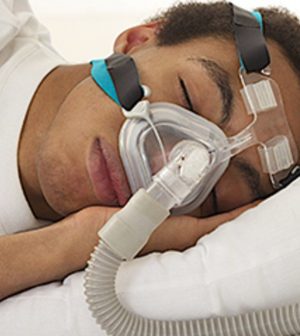- Could Your Grocery Store Meat Be Causing Recurring UTIs?
- Are You Making This Expensive Thermostat Error This Winter?
- Recognizing the Signs of Hypothyroidism
- 10 Strategies to Overcome Insomnia
- Could Artificial Sweeteners Be Aging the Brain Faster?
- Techniques for Soothing Your Nervous System
- Does the Water in Your House Smell Funny? Here’s Why
- Can a Daily Dose of Apple Cider Vinegar Actually Aid Weight Loss?
- 6 Health Beverages That Can Actually Spike Your Blood Sugar
- Treatment Options for Social Anxiety Disorder
Sleep Apnea Lowers Blood Oxygen, Upping Heart Risks

Sleep apnea may increase the risk of heart attack and stroke as erratic breathing causes oxygen levels to drop, new research shows.
“These findings will help better characterize high-risk versions of obstructive sleep apnea,” said co-author Ali Azarbarzin, director of the Sleep Apnea Health Outcomes Research Group at Brigham and Women’s Hospital and Harvard Medical School in Boston. “We think that including a higher-risk version of obstructive sleep apnea in a randomized clinical trial would hopefully show that treating sleep apnea could help prevent future cardiovascular outcomes.”
For the study, his team collected data on more than 4,500 middle-aged and older adults who were part of two research studies — one of fractures in men and the other, a multi-ethnic study of atherosclerosis (hardening of the arteries) that included both men and women.
For every drop in blood oxygen level among men in the fracture study, the risk of a cardiovascular event rose 45%. Among those in atherosclerosis study, the risk rose 13%, researchers found.
Airway obstruction accounted for 38% of the risk seen in the first study and 12% in the other. Similar findings for premature death were also seen.
Researchers said falling oxygen levels mostly owed to obstruction of the airway and not other factors, such as obesity or reduced lung function.
“That’s something that makes this metric specific to sleep apnea,” said lead author Dr. Gonzalo Labarca, an instructor in medicine at Brigham and Women’s Hospital and Harvard Medical School. “The connections are less explained by obesity or another factor.”
Marishka Brown, director of the National Center for Sleep Disorders Research, said understanding these mechanisms could change the way that sleep apnea clinical trials are designed and what is measured in clinical practice.
The findings were published July 26 in the American Journal of Respiratory and Critical Care Medicine.
More information
The U.S. National Heart, Lung, and Blood Institute has more about sleep apnea.
SOURCE: U.S. National Heart, Lung, and Blood Institute, news release, July 26, 2023
Source: HealthDay
Copyright © 2026 HealthDay. All rights reserved.










